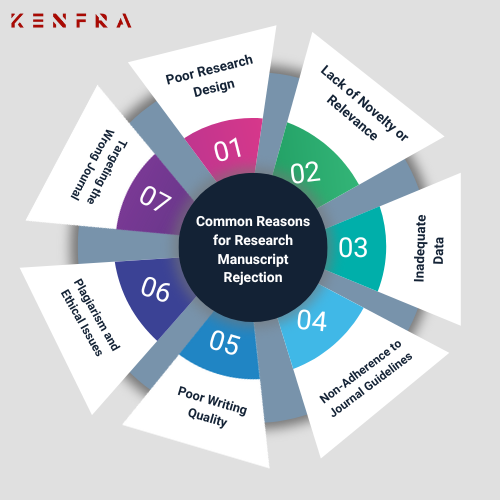16Dec

Submitting research manuscripts to an academic journal is an essential step for researchers seeking to share their findings. However, many research manuscripts face rejection due to recurring issues that could have been avoided. By understanding these common pitfalls, researchers can improve their chances of acceptance.

A strong research design forms the backbone of any scientific study. Reviewers often reject manuscripts with unclear hypotheses, inadequate methodologies, or poorly executed experiments.
Solution: Develop a clear research question and adopt a rigorous methodology. Test your design through pilot studies and consult with mentors or peers to refine your approach.
Journals prioritize studies that contribute new knowledge or insights to the field. Research that rehashes well-known findings or lacks a significant impact is unlikely to be accepted.
Solution: Emphasize the uniqueness of your study. Highlight how your work fills a gap in the existing literature or addresses a pressing issue in your discipline.
Insufficient or poorly analyzed data undermines the credibility of a study. Unsupported conclusions or incomplete statistical analyses are major red flags for reviewers.
Solution: Ensure your data collection is comprehensive and your analysis thorough. Use robust statistical methods and provide clear evidence to support your claims.
Each journal has specific requirements for manuscript format, length, and reference style. Failure to adhere to these guidelines can lead to immediate rejection.
Solution: Read the author guidelines carefully before submission. Tailor your manuscript to meet the journal’s requirements, including word count, structure, and formatting.
Language and presentation play a crucial role in manuscript acceptance. Grammatical errors, ambiguous sentences, and disorganized content make it hard for reviewers to grasp the study’s contributions.
Solution: Invest in professional editing services to improve clarity and coherence. Tools like Grammarly or trusted academic services like Kenfra Research can assist in polishing your manuscript.
Plagiarism, even if unintentional, a major violation of academic ethics. Similarly, ethical concerns in research methods, such as lack of proper consent, can lead to rejection.
Solution: Run your manuscript through a reliable plagiarism checker and ensure proper citations for all sources. Adhere to ethical guidelines in conducting and reporting research.
Submitting your manuscript to a journal that doesn’t align with your research topic or scope a common mistake.
Solution: Research potential journals carefully. Choose one that matches the subject area and impact level of your work.
Rejection is a common part of the academic publishing process, but understanding why research manuscripts get rejected can help you avoid these pitfalls. By addressing these common issues in research manuscripts and investing in professional support, researchers can improve their chances of getting published in reputable journals.
Kenfra Research is committed to helping researchers succeed by offering expert services tailored to address common challenges in research manuscript preparation. From editing and formatting to advanced plagiarism checks
Doctoral Entrance Tests (DET) are commonly conducted by universities and institutions as part of the admission process for doctoral (Ph.D.)... read more
Simulating Success: Mastering MATLAB Simulink for Powerful PhD Research Kenfra Research, your PhD success partner, equips you with the knowledge... read more

Writing a PhD thesis is a monumental task that requires dedication, time management, and strategic planning. As daunting as... read more

If you are dreaming of pursuing doctoral studies, choosing from the top PhD universities in India can shape your academic... read more

Writing an abstract is a very important part of academic writing. If you are a student, researcher, or scholar, you’ll... read more

Choosing a PhD topic is one of the most important decisions in a research scholar’s academic journey. When it comes... read more
IIT Delhi’s Certificate Programme in Data Science & Machine Learning will equip you with a skillset for this growing field IIT... read more
WhatsApp us
Leave a Reply